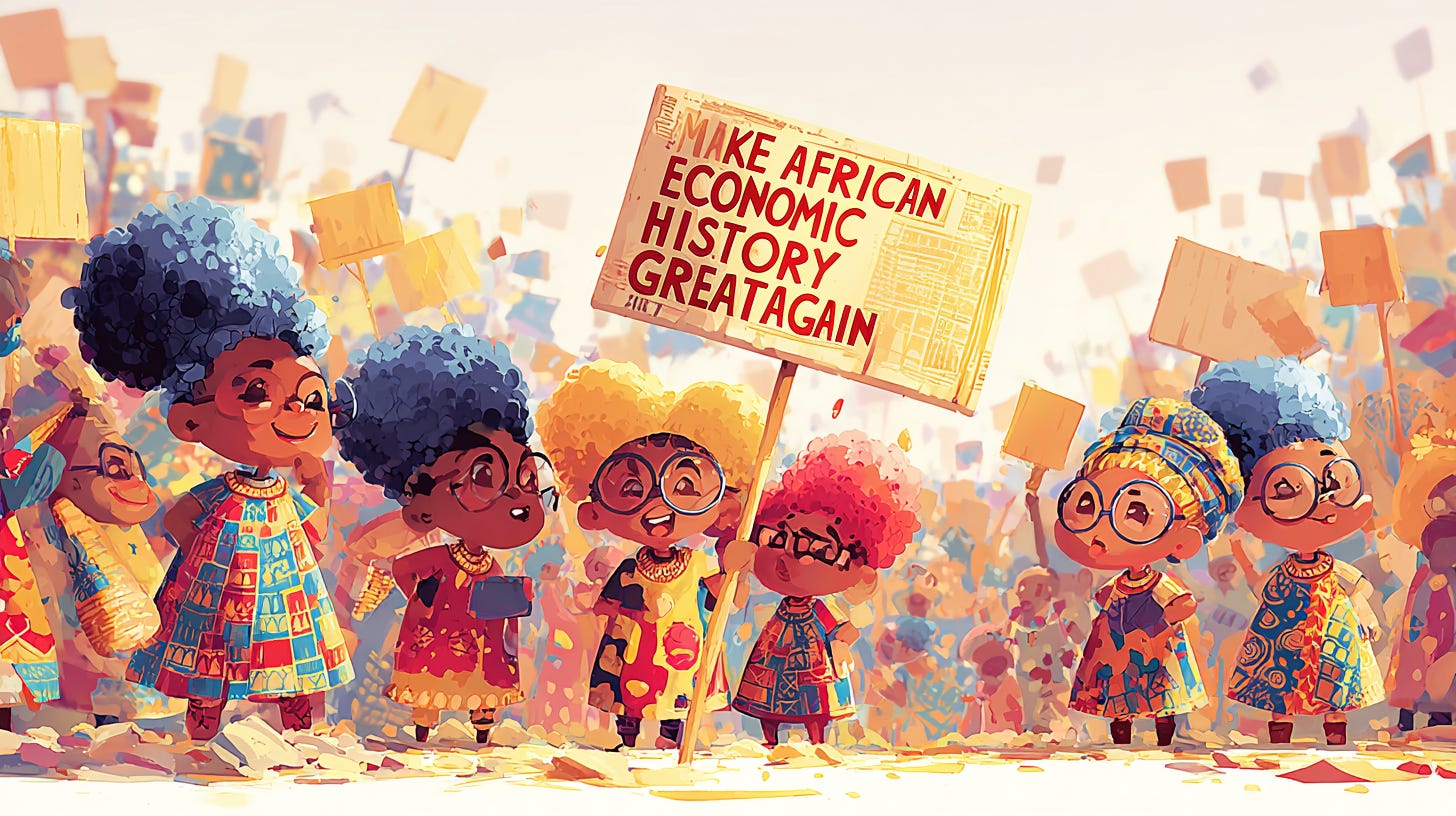Make African Economic History great again!
My keynote at the African Economic History Network meetings in Maseru yesterday
‘Mr Fourie, we have a problem.’ As soon as the OR Tambo customs official said those words, I realised my embarrassing mistake. I had brought my expired passport. Yesterday I was supposed to deliver – in person – the opening keynote at the AEHN meetings in Maseru, but instead, I had to board a flight back to Cape Town, tail between my legs. A big thank you to LEAP researcher Ed Kerby, who delivered the speech on my behalf – by some accounts, even better than I would have been able to. Below is a slightly revised version of the speech Ed delivered.
It would not come as a surprise to this audience that African economic history is in the midst of a renaissance. Scholars in economics and history have returned to Africa’s past with new data and fresh methods, revisiting old debates and opening new ones. The momentum is visible in a surge of publications, conferences, and collaborative projects. The African Economic History Network, founded in 2011 by a small group, now convenes almost a hundred scholars each year. In short, African economic history is back.
But the tongue-in-cheek title of this keynote hints that there is more at stake than celebration. The real question is whether renewed scholarship can not only reveal the past but also help shape the future. The field will be truly ‘great’ when our research travels beyond academia, improving understanding of current problems and informing choices about what comes next. That requires reflection about how we practice economic history. Are our current approaches, however rigorous, producing insights useful for today’s dilemmas?
This lecture argues for an applied African economic history: evidence-based and analytically sober, but consciously connecting past experience to present policy questions and plausible future scenarios. This turn toward application also serves another purpose: it is a recruitment strategy. If we are to be prophets rather than scribes, we must speak to African decision-makers in ways that let them own historical lessons; when policymakers on the continent value the field, young scholars will see that their research has traction and impact. And it will draw them in, so essential in a field where there are still too few African contributors.
To make the case for applied economic history, I summarise the two pillars of the current revival and the contributions they have made. I then reflect on an earlier wave of quantitative history that, as Tony Hopkins reminds us, largely failed to inspire action. From there, I sketch how an applied approach can help guide us on issues the continent faces today. I note new tools – such as computational analysis of textual archives – that allow us to recover evidence where conventional statistics are scarce. I close by suggesting that African economic historians can be, metaphorically, not only recorders of Africa’s past but also guides to Africa’s possible futures.
The two pillars
The renaissance of African economic history rests on two strong foundations. The first is a return to the archives: a sustained effort to uncover and quantify Africa’s economic past through newly constructed datasets. The second is a cliometric turn, using Africa’s varied history as a laboratory of natural experiments to identify how past shocks have shaped long-run outcomes. Together, these strands have placed Africa at the centre of debates about growth, institutions, and distribution.
A new generation has returned to the archives with sharper questions and improved methods. In their prize-winning paper, Ewout Frankema and Marlous van Waijenburg reconstructed long-run wage series, challenging the idea of persistent African poverty. Leigh Gardner’s studies of colonial taxation demonstrated the fiscal fragility of colonial states. Morten Jerven exposed Africa’s poor numbers. Alexander Moradi used anthropometric data to assess living standards. Federico Tadei studied colonial trade. Jutta Bolt has shown how disease environments and infrastructure shaped living standards. Felix Meier zu Selhausen has used death notices and marriage records to study gender and education. Michiel de Haas has built new data on cash-crop production. Rebecca Simson uses probates to study elites. Ellen Hillbom and collaborators have constructed historical social tables to measure inequality. Several of us at Lund and Stellenbosch have transcribed colonial tax censuses to study settler mobility and labour coercion. Many in this audience have used IPUMS census data to map Africans’ changing economic, demographic, and social outcomes. Collectively, these studies have given African economic history the evidence – the ‘what happened’ – to understand the continent’s shifting trajectories. They have greatly improved our measurement of Africa’s past and produced a far clearer narrative of its long-run transitions.
The second pillar treats Africa’s past as a sequence of natural experiments. Acemoglu, Johnson, and Robinson used variation in settler mortality to instrument for institutions and showed their persistence, a paper that won them a Nobel prize. Nathan Nunn linked slave export intensity to present-day differences in development and, with Leonard Wantchekon, to lower trust. More recent contributions broaden the mechanisms: Sara Lowes and Eduardo Montero on sleeping-sickness campaigns; Remi Jedwab, Dozie Okoye, Gabe Brown, Meier zu Selhausen and others on missions, railways, and roads; Belinda Archibong and Nonso Obikili on prison labour; Giorgio Chiovelli and co-authors on landmine clearance in Mozambique. Together, they show that exposure to historical shocks and policies created durable differences in outcomes – and that mechanisms can be identified with convincing empirical strategies.
These two pillars – descriptive and cliometric – have sharpened, as Frankema and van Waijenburg note, our view of Africa’s long-term development and placed it squarely within global discussions about growth and inequality. Yet these achievement also exposes a gap. The revival has been oriented mainly backward, explaining why Africa looks as it does today. With few exceptions, it has been quieter about how insights from the past might inform the continent’s future. If African economic history is to grow further, it must be policy-relevant. Translating historical lessons into forward-looking guidance is the next frontier.
Lessons from an earlier wave
Today’s flourishing of African economic history is not without precedent. In the 1960s and 1970s, the early post-colonial decades saw a surge of quantitative and serial history influenced by the Annales school and by contemporary development paradigms, from modernisation to dependency theory. Scholars compiled series on exports, prices, and population, searching for patterns of development and underdevelopment. Tony Hopkins’s An Economic History of West Africa (1973) drew on trade and production data to challenge Eurocentric chronologies and highlight indigenous dynamics. A rich tradition was being built.
The early flourishing of African economic history also created a tacit division of labour: development economists became policy ‘gurus’, while historians focused on assembling and interpreting evidence. The two communities rarely met. The historians’ mission was purposeful – to dismantle embedded myths about Africa’s past that distorted both scholarship and policy – and contemporary interest was palpable. When Tony Hopkins gave a talk at Harvard in the early 1970s about his book, as he reminded me this week, the room overflowed.
Part of the reason for this was that African economic history was a battleground of ideas with political consequences. Dependency theory – and its close cousin, Marxist political economy – offered an interpretation of Africa’s place in the world that captured imaginations far beyond the academy. Flying from Durban airport recently, I noticed that the only economic history text in the local bookstore was Walter Rodney’s How Europe Underdeveloped Africa. Decades after its publication, there is still a market for that inspiring – if ultimately incorrect – message. The Marxists carried the banner forward, often down a wrong path, but their conviction that ideas could move the world gave the field a sense of purpose.
By the 1980s, the field’s energy had waned. Debt crises, structural adjustment, commodity collapses, drought, and famine reshaped the continent just as intellectual fashions turned inward: postmodernism crowded out serial and quantitative work, while economics grew more mathematical and detached from history. As Hopkins later observed, the African economic historians that remained ‘were concerned to understand the world rather than to change it’.
But perhaps we should take a cue from those dependency theorists and Marxists when we talk about making African economic history great again. They erred in analysis but not in ambition. We, too, need to be both empirical and inspirational. To borrow the motto, slightly adapted, from Marx’s tomb: The philosophers – nay, African economic historians – have only interpreted the world in various ways; the point, however, is to change it.
Why revisit this episode? Because it offers a cautionary tale. That generation of African economic historians achieved a great deal in assembling facts and describing patterns, but did not capture the imagination of those looking to change Africa’s trajectory. Without a normative or applied dimension, their work risked becoming antiquarian – valuable, yes, but seemingly remote from urgent questions of industrialisation, jobs, and state capacity. We should heed that warning. If today’s revival remains focused solely on explaining the past, we risk a similar fade into irrelevance. To avoid another false dawn, African economic history must evolve beyond description and causal inference toward application.
From history to policy
Applied African economic history means using historical knowledge to inform contemporary decision-making. This does not mean abandoning rigour. It means adding a new facet to our scholarship: identifying analogies, lessons, and narratives from the past that can help address today’s challenges. Crucially, framing our work for policy also widens the pipeline of Africa-based scholars. Ministries, central banks, and city governments become natural partners and potential employers of historically informed researchers, creating visible career paths that anchor talent on the continent. Let me be clear about this: This is the only way we make African economic history attractive to the next generation of African scholars.
The timing could also not be more apt. Africa – and the world – faces transformational challenges: climate change, technological disruption, populism, inequality, and public health crises. In such moments, people – policymakers, business leaders, citizens – crave historical perspective. They ask: Has anything like this happened before? If so, what did people do, and how did it turn out? Are there warnings or encouragements we can take from history? Economic historians are uniquely placed to answer these questions.
History serves policy in two ways: it explains the present, and it is analogous to the present. It provides context – explaining the deeper origins of current problems – and it offers a repertoire of case studies. At a recent conference in Stellenbosch, Brad DeLong called history ‘a huge filing cabinet of potential analogies’. Carefully chosen analogies broaden policymakers’ decision sets, helping them imagine multiple futures, not just the one suggested by recent experience.
But choosing the right analogies matters immensely. In crises, people gravitate toward the most dramatic examples. As Bronwen Everill notes, pessimistic analogies often masquerade as realism, while optimism is dismissed as naïve. Humans have a negativity bias. Applied historians must challenge false analogies and highlight the full range of outcomes. Our job is not to cheerlead but to ensure the historical record is used wisely – that decision-makers are aware of positive as well as negative precedents, and that they understand the context that made those outcomes possible. Done well, this applied turn allows African policymakers to take ownership of the lessons of history – and that ownership signals to young scholars that the field has impact.
To do this, African economic historians must be conversant not only with data and theory, but with narrative and communication. We must be storytellers as well as analysts. As Chris Colvin and I have argued, economic history can translate deep scholarly insight into actionable advice by embracing narrative without sacrificing rigour. General theory offers abstract prescriptions; economic history offers context. By crafting narratives grounded in evidence – stories that resonate because they actually happened – we can provide policymakers with analogies that are both compelling and relevant. (To give one very brief example: at a recent meeting with South Africa’s Minister of Trade and Industry, the meeting organiser opened by recounting the story of an ostrich expedition I had written about in a local newspaper. Had I written on the empirics of industrial policy, I doubt he would have recounted my column.)
An applied approach starts from today’s questions and works backward, rather than starting from the past and hoping it becomes relevant. If youth unemployment is the issue, we might ask when African societies faced similar job scarcities – for instance, after World War II demobilisation. If debt cancellation is the priority, we might examine how past initiatives, such as the HIPC programme, combined relief with reform. If automation is the concern, we might draw analogies from earlier technological shifts – the spread of railways, for example, that displaced porterage but transformed commerce.
Applied economic history flips the usual script. Rather than asking at the end of a paper what the implications are for today, it begins by asking what history can contribute to the puzzles that matter now. That requires dialogue with other disciplines and with public discourse. It may mean collaborating with development economists, political scientists, or climate researchers; writing op-eds or policy briefs; framing our work around the big questions that matter to Africans today.
New tools, new narratives
One encouraging development is that we now have tools that can aid an applied approach, especially by expanding the evidence we can analyse. African economic history has long been constrained by limited written records. Paradoxically, this forced innovation and interdisciplinarity. Today, digital humanities and computational methods are opening new ways to analyse Africa’s qualitative riches.
A striking example is the project by Edward Kerby, Alexander Moradi, and Hanjo Odendaal. Using thousands of travelogues and diaries, they apply machine learning to track historical phenomena – for instance, mentions of quinine in malaria zones, which show how disease shaped European expansion. Such work shows how African economic historians can analyse narratives at scale. Text mining, OCR, and AI tools now allow us to convert old books and reports into data, measuring sentiment, extracting events, or tracing perceptions. These methods enable us to study beliefs, expectations, and narratives – the very things that drive behaviour. As Robert Shiller’s Narrative Economics reminds us, stories shape economies as much as numbers do. African economic history should be part of that frontier.
Digital tools also enable wider dissemination. The AEHN’s blog and working paper series reach audiences beyond academia. We should build on this with accessible formats – interactive maps, digital exhibits, podcasts – to inject historical insight into public debate. When a news article claims an African country faces ‘unprecedented’ inflation or migration, we should be ready to ask: is it really unprecedented? Engaging publicly ensures that retellings of Africa’s past are accurate and relevant, and that more Africa-based scholars see economic history as a route to influence.
From scribes to prophets
Making African economic history great again means reimagining our role. Traditionally, historians are scribes: meticulous recorders of the past. That remains our foundation. But we are also called to be prophets: not forecasters of specific events, but guides offering visions of what might happen, grounded in history. We stand at a unique intersection of past, present, and future. By looking backward, we often can see further forward than those who ignore history. More importantly: prophets recruit. By writing with African policy audiences in mind and partnering with institutions on the continent, we expand not only our impact but our community.
This prophetic role matters now because of a pervasive pessimism about the future – what Zygmunt Bauman called ‘retrotopia’. When people lose faith in progress, they idealise the past. Such nostalgia can be dangerous: it breeds fatalism or misguided revivals of outdated policies. We have seen this in Africa too – romanticising pre-colonial forms as cure-alls, or fatalistic claims that ‘we are still cursed by history’. The antidote is a clear-eyed historical perspective that opens our eyes to possibilities for progress. We should use history not only to show how far we have fallen, but how far we have come, and how societies have overcome immense challenges before.
African economic history abounds with examples of agency against the odds: post-1940 gains in life expectancy; post-independence education expansions; the recovery from 1980s stagnation to 2000s growth. These are not naïve ‘happy stories’ but reminders that decline is not destiny. If we only emphasise negative persistence – slavery causing mistrust, colonialism causing weak states – we risk fatalism. Acknowledging constraints must go hand-in-hand with highlighting positive deviation: when Africans broke historical traps, innovated, or proved predictions wrong.
Consider the mobile-phone revolution of the 2000s. Standard economic history might not have predicted that one of the fastest adoptions of cutting-edge tech would occur in some of the world’s poorest countries, yet it did – leapfrogging over landlines entirely. Why? Because when the conditions aligned (cheap handsets, liberalisation of telecoms, and an unmet communication need), African entrepreneurs and consumers seized the opportunity vigorously. As prophets, we should articulate those landscapes of possibility.
To inspire the next generation, African economic history must show that studying the past equips one to make a difference. Our predecessors took the field to great intellectual heights but lost influence when they failed to connect their knowledge to the issues of their day. We have the chance – and the duty – to do better. Let us produce research that meets academic standards of excellence and enters conversations in finance ministries, classrooms, village meetings, and tech incubators. By bridging past and present, African economic historians can make the field great again – great in its scholarship, and great in its relevance to Africa’s next chapter. In doing so, we move from chroniclers of change to active participants in Africa’s unfolding story, using the light of history to illuminate the road – and our long walk – ahead.
‘Make African Economic History great again’ was first published on Our Long Walk. The images were created with Midjourney v7.








